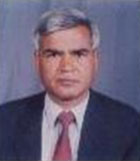Third IDSA Annual Conference on South Asia
Speaker Profile: Prof Krishna Khanal
 Prof Krishna P Khanal holds Master’s Degree from the Tribhuvan University, Nepal. Currently he is a Professor of Political Science at Tribhuvan university and is teaching in the Central Department of Political Science, Tribhuvan University (Kathmandu) for more than 30 years. Prof. Khanal has extensively written in contemporary politics of Nepal and engaged in public discourse nationwide. His latest publications include Nepal’s Discourses on Constituent Assembly (2005), Restructuring the State (in Nepali, 2008), He has edited Federalism in Nepal -Execution and Management (in Nepali, 2008).
Prof Krishna P Khanal holds Master’s Degree from the Tribhuvan University, Nepal. Currently he is a Professor of Political Science at Tribhuvan university and is teaching in the Central Department of Political Science, Tribhuvan University (Kathmandu) for more than 30 years. Prof. Khanal has extensively written in contemporary politics of Nepal and engaged in public discourse nationwide. His latest publications include Nepal’s Discourses on Constituent Assembly (2005), Restructuring the State (in Nepali, 2008), He has edited Federalism in Nepal -Execution and Management (in Nepali, 2008).
ABSTRACT
Federalizing the Nepali State: Challenges and Opportunities
Nepal has decided to transform the present unitary state into a federal one. The Constituent Assembly (CA) is scheduled to enact new constitution by May 2010 to this effect. Most of the political parties have accepted the federal system in principle. CA Committee on the restructuring the state is working out the details of the federal system. However, it has yet to complete its report. The first prerequisite to be a federal state is to carve out the constituent units of the federation. Several models are being floated by political parties, ethnic communities and individual experts. Ethnic activists are advocating the federalism in ethnic line. Others argue that the units should be carved out taking into account of the mixed pattern of the population settlement and Nepal’s economic and development reality. Opinions also extremely differ in number and names of the proposed federal units and so the division of powers between the centre and the units particularly in the matters relating to natural resources and revenue sharing. Political parties are yet to hammer out their differences and reach at consensus. Against this background this paper will seek to explain and analyze the nature of debate on federalism in Nepal, various proposals that are under consideration, challenges of federalization and future of Nepal as a federal state



